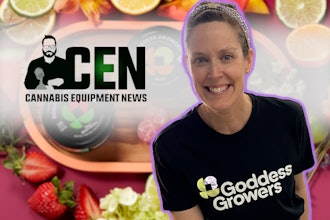Jonathan Swope has been a cannabis connoisseur since his adolescence. He was interested in getting involved in the industry's business side when California legalized cannabis. So Swope started shopping around, looking for different licenses and trying to find a place to start.
He ended up in the Coachella Valley, making wholesale distillate in Cathedral City with an extraction license. Solis was making about 100 kilos of distillate per month when Vape Gate rocked the market, cannabis users were falling ill, and some died, after Vitamin E acetate was found in vape cartridges from the illicit market.
Before Vape Gate, Solis was experiencing up to $1.2 million per month in sales. The figure quickly dropped to $600,000, then $30,000 and finally $0. In the industry, such a scandal is known as a "cannabis extinction event." Some companies closed up shop, and some stayed the course, but Swope knew Solis needed to control its own destiny. Solis needed to control its own supply chain, from seed to dispensary, if it was going to continue on and weather future storms.
The team at Solis realized they had to adapt to survive, so they moved to Santa Barbara and bought a dude ranch. Swope wanted to play both sides of the market, flower and distillate, because the cannabis industry is unpredictable, and you never really know what is coming down the pipeline regarding new regulations or scandals.
Buying a dude ranch and turning it into a cannabis farm presented a new set of headaches. For example, the company moved to Santa Barbara in 2019 and just as Solis was working on permits, the COVID-19 pandemic hit. Everything slowed to a snail's pace.
And then came the next greatest foe: the endangered California tiger salamander. It turns out that Solis bought some 600 acres of land home to an endangered species, and the company had to take incredible precautions to make sure the farm wasn't adversely affecting the salamander.
While it was difficult, Swope maintained the old boy scout mentality to "leave it better than you found it" and did everything above board and with the best interest of the salamander in mind. Still, to this day, he has never seen an endangered California tiger salamander on the Solis property.
Using stabilized genetics, Solis grows high-THC sun-grown cannabis. Swope says the sun yields more cannabinoids and terpenes and, thus, a better flavor profile. And despite leaps in lighting innovation, making an exact copy of the sun is still impossible. The Solis team is still learning more about the area's "Goldilocks" micro-climate, fine-tuning what works and discarding what doesn't.
In this episode, Swope also discusses:
- Why conservation efforts make business sense
- Using automation in cultivation
- Rigorous quality control and the importance of flower presentation
- The company's state-of-the-art fertigation system
- A new partnership with Petalfast to help scale the business.
Please make sure to like, subscribe and share the podcast. You could also help us out by giving the podcast a positive review. Finally, to email the podcast or suggest a potential guest, you can reach David Mantey at David @cannabisequipmentnews.com.






















